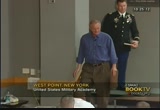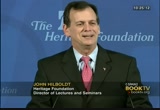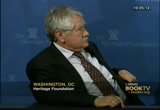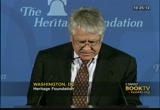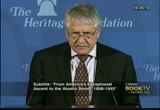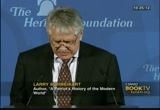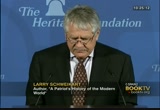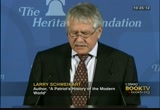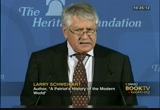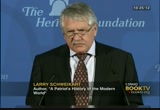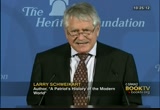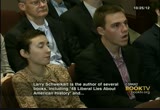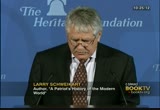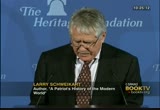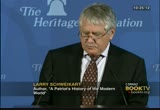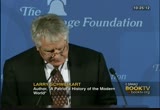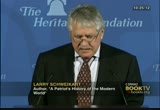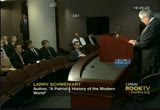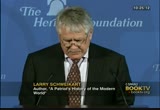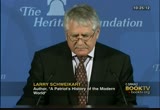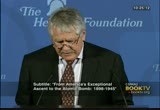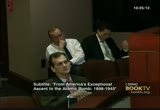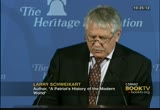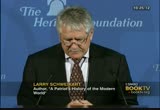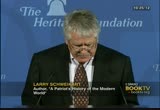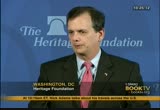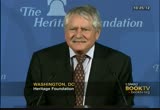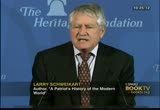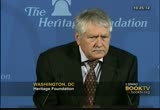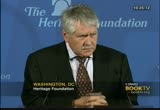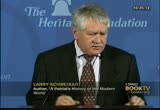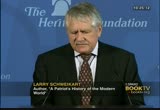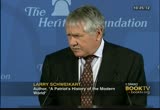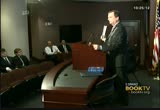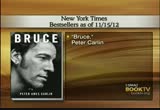tv Book TV CSPAN November 18, 2012 9:30am-10:15am EST
9:30 am
tweet us your feedback, twitter.com/booktv. for the next 45 minutes, larry schweikart presents a history of america's global participation and influence from 1898 to 1945. the author posits that during this time the united states introduced numerous political, cultural and economic ideas to the rest of the world. >> good afternoon. thank you for joining us here at the heritage foundation in our louis lehrman auditorium. we welcome those who join us on our web site on all these occasions. if you'll be so kind to check cell phones one last time and see that they're turned off. thank you, larry. amazing how many speakers actually start doing that when i say that.
9:31 am
we will post the program on our web site within 24 hours for our future reference and, of course, our internet viewers are always welcome to e-mail us with questions or comments, simply writing those to speaker@heritage.org. our guest today, dr. larry schweikart, is a native of arizona. he earned his bachelor and master's degree at arizona state university and received his doctorate from the university of california santa barbara. throughout his high school and college, however, he spent most of his time playing drums in a vary of -- variety of rock bands. he was part of several groups, one of which opened for steppen wolf among other performers for those old enough to remember them. his first film, "rocking the wall," began airing on pbs this week and will continue throughout this year. dr. schweikart serves on the faculty at the university of dayton where he has taught
9:32 am
business, economic history as well as military history. he is the author of more than a dozen books including, first, "a patriot's history of the united states," which he co-authored. other topics on which he has written include national defense, history and histography and the u.s. economy. a television series based upon "patriot's history of the united states" is currently in development as well. we are pleased to welcome dr. schweikart to hear about his newest book, "a patriot's v. of the modern world -- version of the modern world." please join me in welcoming larry schweikart. larry? [applause] >> well, thanks so much to heritage foundation for inviting me here. it's really an honor, and it's one that i wish my father was alive to see. heritage is one of those great bastions of liberty in a
9:33 am
swelling sea of collectivism. you probably didn't know that you were getting somebody here that was a previous rock drummer. this later became significant in learning, as a learning experience when i began working on this film. but all along my experiences in the rock band were actually pretty informative. i tell my students i know all about communism because i was in a rock band. we shared everything, had nothing and starved. [laughter] when mike allen and i wrote "a patriot's history of the united states" in 2004, we identified three major elements that made up americanism. nevertheless, we never really provided a definition of american exceptionalism. and during our revisions over time, we kind of corrected that for the next edition that we hope will be out next year. even in 2004 it seemed a natural progression to move toward a history of the world, especially
9:34 am
the modern world. it's the modern world that we see the true fullness of american liberty and prosperity on display. and under attack. through an amazon book review of "patriot's history of the united states," i met dave doherty, an arkansas businessman, historian, computer expert from evening shade. yes, there is an evening said, arkansas. we first began a top to bottom errors remain anything "a patriot's history of the united states," and then over time i discovered he's a wonderful co-author, so i asked him to help me with "patriot's history of the modern world." as a former intelligence officer in the army, he brought a new perspective to the cold war, especially in the second volume that we're working on now. and, um, as jon mentioned, this is volume one, goes up to 1945. volume two will be out about this time next year, 1946 to the
9:35 am
present. i have to warn readers up front, especially those who have seen me speak before, probably know me for a little more lighthearted or comic insertions, but this is a very sober and serious book. after all, the period from 1898 to 1945 is an era dominated by two unspeakably deadly world wars sandwiched around a nearly worldwide depression and characterized by such loathsome villains as mussolini, stalin and hitler. i don't even think joe biden could laugh at that material. and while we have some sidebar sections, one of my favorite is a compareson and contrast between the world's three leading architects of the day, frank lloyd wright and tony goudy and walter gropius who epitomized nature, god and man in that order, or the daring race for the north pole. the bulk of this book is
9:36 am
dedicated to those political forces that reshaped the century. as one who gravitates toward the great man theory in most of my history, i was almost at a loss for words last week at a book signing event when a questioner asked me who's the most important person in your book. dawned on me this really isn't a book about most important people, it's a book about great ideas and terrible ideas. ideas that in the course of the century were tested in the most climactic of ways; war. but the most important of the ideas that we discuss is something many writers and intellectuals pay lip service to, american exceptionalism, but which no one has really defined. we were kind of surprised as we went through to find there really wasn't a god definition of american -- a good definition of american exceptionalism. so i think that's our first accomplishment in "patriot's history of the modern world," we
9:37 am
examine and define american exceptionalism through the identification of what we call the four pillars. these pillars shaped america, and then those same pillars were often largely or even entirely ignored in shaping the postwar world in world war i and then later in the decolonization of the third world which is part of the second sol -- volume. this book follows the 50 year struggle between constitutionalists who want to strengthen the four pillars and progressives who want to destroy them. what are the four pillars? first, america was founded on the christian religion and predominantly influenced by protestantism. by the 20th century, catholics and jews mayed an important role, the -- played an important role, even the progressives emerged from the liberal protestant churches. this reinforced the second
9:38 am
exceptional pillar, common law, which which posits that god has given or that law is given from god to the people, and it bubbles upward to the rulers. this gives us the government of the people, by the people and for the people that lincoln referred to. common law stands in stark opposition to almost every other nation on earth that has developed some form of civil law in which law trickles down from the top. both germany and england had common law, but by the 20th century, both had nonetheless abandoned it. therefor, by the end of world war or ii when -- world war ii when europe unloaded its colonies, those colonies were themselves designed on principles of civil law. thus, the first two pillars taken together mean that a christian, protestant religion influenced and shaped everything about america's foundation of laws and defined it system of
9:39 am
personal rights. it wasn't just that the united states was a democratic republic, but that the very premises of what a democratic republic meant were likely to be far different in the united states than anywhere else. um, the second -- the third of the pillars involves economic freedom. private property rights with legal titles and deeds in a free market economy. now, these may seem synonymous, but they are not. as hernando desoto pointed out, in many places of the world, there's a semblance of a free economy at work, but there's no system of title deeds to land or other property. this has two significant effects. first, it means property ownership is never secure. you can never be sure the government won't come around and
9:40 am
grab what you have. second, though, it means individuals with deeds and titles can use their land as collateral for business loans. this in turn elicits growth. in 1898, the united states had all four of these pillars. britain had three -- was slowly losing common law -- france, germany and most european states have three, but some european states have their religious character already beginning to fade. but around the world in africa, asia, latin america few states had common law and property rights with titles and deeds. america first came to world prominence after the spanish-american war ended in 1898. for the first time, it's argued largely by leftist historians, the u.s. acquired an empire with cuba and the philippines. yet this war only revealed the
9:41 am
deep difference between america and everyone else in history. for one of the first things the american congress did after the war was pass a law requiring the united states to give up cuba. one searches in vain for major world powers who ever voluntarily departed from conquered regions. as the 20th century dawned, a group of liberal elites who embraced the program loosely known as progressivism challenged and criticized these four pillars. most were hostile to common law with presidentwood roe wilson being the prime example of one who thought the constitution needed to be malleable and only the fittest should direct society. europe entered a decade in which it convinced itself war was ill possible. the book "grand illusion" captured the view that europeans were too advanced, too fist candidated to fight each other -- too sophisticated to fight each other. john maynard keynes echoed this
9:42 am
with his famous observation about how an englishman could order from his doorstep products from far lands and have them -- faraway lands and have them delivered to him. it's kind of an early version of thomas friedman's delve theory which claims that advanced countries that use computers won't go to war together, i call it the starbucks theory. i guess unless they have triple espressos. in a much different way, it was posited that war would be so bloody that no one would dare risk a conflict. all of these views assume that european leaders would be rational, a stretch even in the present day. this, of course, vanished in august 1914. a war sparked by one of the most unlikely of accidents when archduke ferdinand on his way back from a speech turned away
9:43 am
from his planned route to visit a guard injured in an earlier, failed assassination attempt. of course, he drove to his death, an incident that would plunge the world into a conflagration. i won't delve into the details of world war i here. perhaps the most significant aspect for the united states was that when america finally entered the war, the british and french hoped to insert american boys piecemeal into their own shattered units. general john "blackjack" pershing utterly refused, insisting that the americans fight as an independent army, which they did. the revival, though, of progressivism came at the versailles conference in 1919 but not the actual final arrangements in most cases. practical british goals of eliminating the german navy or the french objectives of eliminating germany as a land-based threat received
9:44 am
wilson's support so that he could institute a league of nationings. a feel-good, toothless, unmotivated group of international elites. but wilsonian idealism did play a central role in reshaping postwar europe's map as millions of people were moved around the continent like chess pieces and borders were changed like lines on an etch a sketch. one very tie participant called people under discussion, quote, abstract lumps. another warned, quote, the phrase "national self-determination" is simply loaded with dynamite. it will raise hopes that can never be realized. think of the misery it will cause, unquote. british diplomat harold nicholson walked into a study to find woodrow wilson bending over a giant map spread on the carpet. he said, quote, they are cutting the bag gad railway.
9:45 am
columnenseau with his blue-gloved hand looks like a gorilla of ivory. it is appalling these irresponsible men should be cutting asia minor to bits as if they were dividing a cake. entire or populations were relocated to facilitate national self-determination, and democracy was imposed on nations that lack the most basic of pillars of exceptionalism. it's hardly a surprise that within a decade most of these had collapsed into totalitarian dick dictatorships, unstable, unpopular or undesirable democracies or autocratic regimes. rather than blaming communism or progressivism, most of the collapsing states had vented their fury on democracy and democratic systems. but the '20s, which produced an astounding level of wealth and high standard of living in america, had a dark side in europe and america through the
9:46 am
birth of public health programs that quickly morphed into eugenics. concerns about public hygiene masked deeper hostility to the jews in europe and to ethnic minorities in america. as early as 1920 in germany, lawyer carl binding and psychiatrist alfred hausch called for, quote, the destruction of life that is no longer worth living. can you say death panels? hausch insisted it was a doctor's natural duty to, quote, eliminate idiots and the valueless, unquote. voluntary sterilization laws were passed in sweden, norway, switzerland. those identified with mental disorders, quote, a social problem group. in both europe and america, this fused easily with eugenics. in america a group was led by such people as margaret sanger
9:47 am
whose journal, "the birth control review," endorsed her friend stoddard's book, quote -- the title was "the rising tide of color against white world supremacy." her infamous negro project used black ministers, including adam clayton paul, to promote birth control. but the effort in england, germany and the united states to promote eugenics ran far deeper than the rantings of stoddard and hausch. they found support from the national committee for hygiene urging sterilization as a means to, quote, prevent this class of persons from propagating, unquote. germany used venereal disease laws to enlist doctors, greatly extending the power of the state into the private sphere and producing a union with the medical profession that would be per vermonted rather easily --
9:48 am
perverted rather easily in the third like. one expert observed, quote: the more scientific a doctor's outlook was, the more politically naive he was. it was perhaps the highest and most sinister irony that charles davenport giddily wrote mary herriman, who headed the eugenicsing record office in new york, saying, quote: the fire you have kind led is going to be a purifying conflagration one day, unquote. his prophesy would come true only 20 years later at a cost of millions. it's fairly easy for governments to manipulate public health, medicine and doctors for purposes of, quote, family planning. this soon bled into policies about colonial possessions and citizenship. peoples of egypt, india, algeria and africa clearly did not forget the progressives' view of
9:49 am
educated elites and by their definitions were close to, quote, unworthy of life, unquote. but these trends would marinate for a decade. in the meantime, american prosperity continued spreading to the rest of the civilized world. american advertisers, film, even literature became highly desired in europe. it's another irony at this time, american movies followed a production code that emphasized universal american themes of patriotism. god, fair play, and they avoided sensationalism, sexual situations and other taboo vices. american movies sold american sensualism including, quote, puritanical mormonism, as one put it. they occasionally made fun of those values through the work of buster keaton and charlie chaplin, but this was never meant to totally undermine the system itself. by 1930 the u.s. had 18,000
9:50 am
movie houses and compared to france's 2400 and britain's 3,000. europe simply could not compete with hollywood, and as long as hollywood sold american exceptionalism, europeans wanted to be like mike, or in this case be like clark gable. but inflation, communist agitation, ethnic unrest and most of all the conflict of versailles soon caused the structure to tumble into the totalitarian moment. spain, of course, with its civil war was the first to see the future. its fascists roads to power in i -- rose to power in italy, then germany, then a samurai culture in japan where assassination awaited anyone who questioned the destiny of japan to rule all of asia. the remaining democracies in europe lacked the will to stop
9:51 am
even the weakest of aggressors. when mussolini success any crushed ethiopia, the entire notion of collective security was already dead. and this, of course, was long before hitler invaded poland. world war ii, let me only briefly say that what saved the world, in our view, was that the progressive/liberal new deal government of franklin d. roosevelt most likely out of sheer desperation unleashed the productive power of free market capitalism to bury the axis powers in a tsunami of tanks, planes and ships. anyone who's read my books knows the statistics. up in lima, not far from where i teach, a tank was built from scratch in four and a half hours. henry kaiser's shipyards turned out a liberty ship in a record four and a half days. that's faster than most of my students can write one of their semester papers.
9:52 am
this undergirded american military strategy of using weapons and technology to thoroughly pummel the enemy before a single american soldier was sent into battle. the war also exposed the fact that japan, which adopted some of the capitalistic production methods seen in america, lacked the essential pillars of exceptionalism to employ them fully in wartime. without free speech, free markets, constitutional protections that allowed great inventers and businessmen to try new ideas and fail without punishment, japan fell behind the u.s. almost instabilitily. in four years of war, the u.s. produced 17 fleet carriers. japan, one. we go into, for example, um, two guys viewed as failures or at least not very successful guys, and that would be ann true
9:53 am
jackson -- andrew jackson higgins who produced an incredible number of craft, landing craft, but after the war was kind of harassed out of business. but especially we look at people like howard hughes. how'd houston was this giant -- howard hughes was this giant failure in world war ii. he produces these wooden reconnaissance airplanes very fast, but they aren't really in use before the end of the war. misses the whole point. people like howard hughes were necessary so that we could have people like henry kaiser. it's only because you have the failures that you know what doesn't work. every time something doesn't work, you know not to go there. and so it's because we have this and other countries did not, they insisted that you win every time or you die, that's going to cause a problem down the line. it's no different than europe. the german miracle of economic production was, in fact, a
9:54 am
facade supported by mass conscription that eliminated unemployment. but by 1934 and early 1935, germany's economy was already rolling back to its pre-hitler status. only the imp position of -- imposition of tariffs and soon the acquisition of vast new lands and slave workers allowed albert spear to sustain nazi production. even then germany faced a fatal and hugely-ironic reality of reverse -- [inaudible] in which undesirable peoples were flooding back into germany to sustain the war effort while german soldiers in vast numbers were being sent to russia to die. when the germans vendorred and -- surrenders, the american propensity to save dear human lives while wasting cheap bullets and bombs reached its
9:55 am
zenith with the dropping of the two atomic bombs. vir culley all -- virtually all of the relevant evidence, recent evidence from both american and japanese sources validates president harry truman's decision to drop both bombs. japanese leaders did not display the slightest acknowledgment of military reality illustrated i be a report of japan's top atomic scientist who was sent down to hiroshima the following day, and he had to report back to the emperor, and he was asked, was this an atomic bomb? yeah, it's an atomic bomb. then came the line, how long til we can make one? that's hardly the response of somebody looking for a way to surrender. truman intended to show japan that he would use any weapon at our disposal. there was no atomic diplomacy. he wanted to show the japanese that it was surrender or die.
9:56 am
with japan's surrender came the temporary victory of the principles of american exceptionalism worldwide. unlike all the previous empires, the u.s. was unwilling to dominate the free world the way previous victors had. that postwar world asked of america that it share its resources unreservedly, restrain itself economically and rebuild both former friends and enemies enthusiastically. this in turn would produce heretofore unseen wealth and leisure in western europe, all provided by the protection of the american military. that wealth and leisure would, in turn, erode the very institutions and disciplines needed to maintain let alone expand freedom and prosperity for others. i want to mention just for a moment the role of the soviet union in world war ii, because i think we take this on as a
9:57 am
challenge to much of the prevailing wisdom. yes, after 1942 the red army overwhelmed the nazis in men and tanks. but it was nip and tuck in the winter of 1941-'42. one study suggests that a full 85% of heavy armor outside moscow in the winter of 1942 was british. the best fighter plane in 1941-'42 in the red air force was a plane the americans wouldn't even fly, the p-39 air cobra. we supplied the soviets with all their radios, all their radio wire, all the shipping to provide all that stuff, trucks. all they had to do was get men in uniform and make tanks and artillery which they did. so, yes, they overwhelmed the nazis, but it came with a fantastic amount of support from the united states. as american soldiers arrived in
9:58 am
england, the new war began between american and british generals for the command of allied armies. dwight eisenhower was the supreme commander, but the british constantly carped about him and denigrated american troops and generals in private and public. ike's great talent was that he found a way to brush this aside much the way george washington brushed aside his own complaining subordinates in the revolution while at key moments he put his foot down and essentially told the brits to stuff it. that didn't stop field martial bernard montgomery from becoming a thorn in the side of all american commanders in europe for the duration of the war, but ike, omar bradley, george patton all managed to work around to minimize the negative impact of the war effort. so when the war ends, we are expected to supply wealth and prosperity to all. we do to the best of our ability. and yet this brings with it this
9:59 am
irony that by supplying wealth and protection, you are eroding the very disciplines that are necessary to maintain and perpetuate prosperity for yourself and prosperity and freedom for others. that would be the challenge of the next 75 years and the topic of volume two. how to provide a canopy of liberty and perpetuate american exceptionalism while allowing in just enough of the reign of difficulty and disappointment to remind americans and the world that the era in which we have all been blessed was no golden accident. and with that, i'm open for questions. [applause] >> we will accept questions from the floor. there will be a microphone passed, and when you are recognized, if you would not mind stating your name and affiliation if there is one. i have a first question for larry, is there not a fifth
10:00 am
pillar, what i would call the american spirit? that most of the people that came to this continent chose to come to do what they could do for themselves and how well they could do as opposed to starting to ask, i'm here now, what are you going to do for me? >> you know, that's a, that's a subject of heated debate among americanists because many americans will argue, well, we got the dregs. the famous line from bill murray's movie "stripes" where he's saying we're the leftovers, we got kicked out of every good country in the world, every decent country in the world. so i do agree there's an american spirit, but i think it's contained in the existing four. but, yes, that's an important element of americanism, to be sure. ..
10:01 am
it's a flatscreen tv, heard from starbucks. but the tank or a bullet or a bomb. he would gladly forgo products to find that. so the first thing country dvd weaknesses they convert into wartime goods. the second thing i would argue is in fact world war ii does stimulate but not for all of the demand keynesian reasons usually
10:02 am
given. it stimulates because it's a giant supply-side. but others as americans have nothing to buy for four years. no factories making the cars. they're not making any consumer items at all. there's nothing to buy. so most americans at the urging of their government and best in the invested savings on spirits at the uniform have come four and a half, five years, they have all this pent-up demand, but they also have invested for four years in business now has the levey chipmaker giant supply-side investment. i think it's the classic guilder -esque response to an economic situation. this is the opposite of what keynes argued. >> what do you think -- [inaudible]
10:03 am
required to keep the exceptionalism of robust idea? >> that's of course the question before us right now and it is how much it the city, how much the national difference, how much diversity do you permit and without destroying the elements that permit the diversity to come in in the first place? thinks her english language is one of those things that must be maintained. acting certainly having control of your workers is absolutely essential. i think there are a number of cultural issues that probably have to be maintained or religion and so on. charles murray, not to put another book on booktv, but charles murray has agreed book called coming apart to make use of these very issues that it shows how segregated our society has become in the last 50 years. appreciably, and he doesn't
10:04 am
because i'm not a marxist, but class ways. it's very true. i remember growing up in chandler, arizona, a city of about 12,000. my dad was a ranch foreman on a cattle ranch, didn't make a ton of money and somehow he provided by my mother, college education, insurance. i don't know how he did it. but look at another middle class family and i look diagonally about the richest families in chandler, a big farming family in the lot next to them was their pool at their pool house. who's the guest of their pool every single week? me. who plays monopoly with their kids? me. you don't see that much anymore. they are highly insulated and rarely get middle america at all. it conceptually, culturally in terms of entertainment is just a terrible split and that is something we have to repair.
10:05 am
>> matlin, charles coe foundation. [inaudible] is not undermining the order? >> no. all quarter has certain constraint syntax within. i think that spontaneous stuff has to happen when you have control of your borders, when you have the bush language. let me go back to a previous book to get a plug to that. but what the founders say? one of the things we noted or i noticed on the section on education has surprised me was almost all the founders savers consider public education. i was getting into that i felt kind homeschoolers here. it didn't happen. what i found was in that public education they accepted and demanded that certain things be tied.
10:06 am
the certain things for math and language skills, but also a patriotic history. this was the phrase they actually used. a history of how great it is to be an american. since i didn't prepare that book for this talk i to advice, but said something to the extent that all these other countries are great. all these other countries have stepped, but we are the best we can understand them and so we understand ourselves and we must teach a patriotic american history. sabato said in the family that in order to have spontaneity you have to have a certain construct a structure. >> heritage foundation. how would you evaluate fdr's overall legacy? >> disaster. i think he set america's economy back eight, 10 years.
10:07 am
there's very good evidence now and i call your attention to study by stephen.com io, which is not widely cited. the study is one of the wage and hours out. he shows this act alone probably insured would never get that in 1829 employment under roosevelt. recently he compares the hours work to business confidence in business expectations. but he shows is the number of hours worked when down -- i'm sorry for a number of workers stayed constant while the number of workers went down. in other words, they were going from 10 full-time employees to five part-time employees. something along those lines. he finds 85% to 90% of the decline after 1934 when the first wage and hour's act goes into place can be traced rightly to this idea of a minimum wage.
10:08 am
in terms of all the other regulations, excessive taxation is one disaster after another. one of the things we do in the future is history as we have a three-page chart that i've never seen anywhere else. the new deal and new deal program. we show with the program was, what its original goal was and what it looks like 50 years after. it's amazing 50 years after multisensor disasters for banking regulation to minimum wage laws to agriculture. my stepfather but my dad died my mother remarried another farmer. i used to do his folks and i remember getting the government subsidy checks. i want to thank all you guys for putting me through school. i appreciate it. they were huge. it was ridiculous for getting this all as part of the agricultural adjustment that pays farmers not to grow. you students, come on. you are going to get paid not to turn in papers?
10:09 am
teachers get paid not to teach? is the equivalent of the opera cultural adjustment act. so without that, we might've been without the war because as i say, roosevelt out of desperation turns really, unleashes american business, turns the market principle must be american businessman more or less free. idea back [inaudible] >> howard's history is primary text in some classrooms in america. i do introduce the united states to an audience who might have grown up on people's history? have you introduced your work in your frame of reference to the might've started with a different? >> i have those talk why students need to patriots history the united states.
10:10 am
a couple years ago i did a book called 40 liberal bias about american history. it's a clever title. college textbooks and what i found was that they all come almost to the exclusion shared certain similar falsehoods like the rosenberg were innocent or one favor one is transcontinental primrose never would have been built without government help. and in fact, candidate barack obama used that example when he was arguing for a computer czar. we need to have a computer czar because at about the transcontinental's could have been built without government help. excuse me, there's a guy named james jay hill and james jay hill but the northern pacific railroad without a dime of government support. and guess what? is the only one not to fail in the panic of 1873. all of the government supported rivets collapsed because they are not profitable.
10:11 am
now, male students usually come to me having not read them. i get constant e-mails from people that said we had to read them in school and they died for your boat. i'm sure sends errors get those messages. thank god for your book. i don't introduce it. it is just out there for people to get. it is interesting we are making rapid progress towards catching them in total sales in the last four or five years our nature check to return the sketch and pretty soon. yet about a 15 year head start. >> graininess pete gillen. i'm numbing core fellow at the olympic council. number one, your thoughts on how profound the paris peace conference was, specifically carving up the rest of the 20th century. and number two, why did you choose the flag raising --
10:12 am
[inaudible] >> number one, perhaps next to the new deal the for psycho but this one of the worst things of the 20th century. it not only is back from the standpoint of destroying national entities by moving people around and putting them in a situation where there's going to be inevitable conflict. that is one of the things it does. it destroys the very concept of collect security because obviously league of nations is a demonstrative failure. in terms of the flag raising on sir bocce, it just seemed very symbolic that the flag is set america's startup of this racing. semper fi. >> any other questions? thank you, larry. >> thank you.
10:13 am
[applause] >> and most notably do have copies available. larry will be glad to sign them, have additional conversation on the panel table appears well. we thank you for your kind attention and hope you see you in the future. >> for more information, visit the author's website, p. street history u.s.a..com >> you're the best-selling hardcover nonfiction books according to "the new york times." the list reflects sales for the week of november 12.
141 Views
IN COLLECTIONS
CSPAN2 Television Archive
Television Archive  Television Archive News Search Service
Television Archive News Search Service 
Uploaded by TV Archive on

 Live Music Archive
Live Music Archive Librivox Free Audio
Librivox Free Audio Metropolitan Museum
Metropolitan Museum Cleveland Museum of Art
Cleveland Museum of Art Internet Arcade
Internet Arcade Console Living Room
Console Living Room Books to Borrow
Books to Borrow Open Library
Open Library TV News
TV News Understanding 9/11
Understanding 9/11